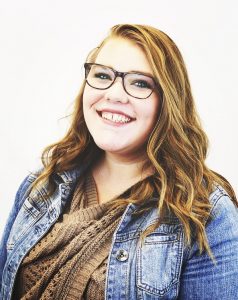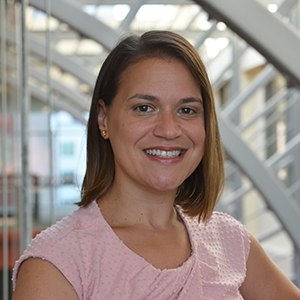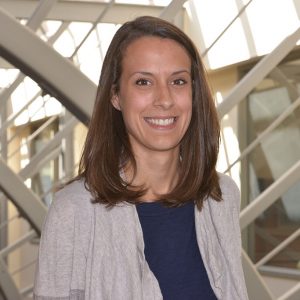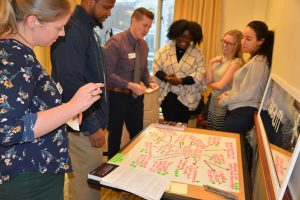First-year HESA students who are enrolled in EDLR 5105: Structured Group Dialogue in Student Affairs recently hosted a gallery walk in Storrs. The event showcased student-created, interactive visuals that expressed student’s learning as a result of the course. View the Neag photo album.
News
What’s Missing With Heavy Drinking and Hazing on Campus
HESA’s Adam McCready writes an original commentary on masculinity and drinking problems in college fraternities in The Conversation.
Series Expands Discussion of Research on Undocu/DACAmented Community
“This past academic year, UConn’s Neag School of Education, along with UndocuScholars at the University of California Los Angeles and the Association for the Study of Higher Education (ASHE) Presidential Commission on Undocumented Immigrants, co-sponsored a research brief dissemination series highlighting issues related to the undocu/DACAmented community. According to HESA’s assistant professor, H. Kenny Nienhusser, the goal of the series was to make research in this area accessible beyond traditional academic spaces.” Read the full Neag School of Education story.
Humans of HESA: Bailee Raber
For current student Bailee Raber, pursuing a master’s degree in Higher Education and Student Affairs (HESA) was a natural choice. As an undergraduate student at Eastern Michigan University, she was deeply involved with undergraduate admissions which spurred her interest in UConn’s program. 
In her assistantship with off-campus student services, Raber advises commuters and other students living off-campus. She empowers her students so they can find their own answers and provides them with the tools to pave their unique paths. Although she can’t change an immediate outcome for a student, she pushes her students forward to achieve personal success.
As a student affairs practitioner, Raber takes self-reflection to heart especially in regards to serving her students in the best way she can. She understands that behavior and self-discovery are huge factors in improving your relationship with your students, as well as with yourself. Raber shares that helping a student, connecting them to resources, or simply providing them with a soundboard where they can freely express themselves, offer the most rewarding experiences. She strives to be a pillar of support to her students and aid in their individualized journeys to success.
Raber urges students to “Connect and vent to others going through the same experience.” She appreciates the friends and mentors who have stuck by her side through the ups and downs and says that the program has been “One of the best things that have ever happened.” Within HESA’s cohort model, Raber has been able to connect with like-minded individuals and create long-lasting friendships. Especially during times of doubt and apprehension, Raber says,
“These people become your family and help you through those more challenging times.”
Despite her busy schedule as a full-time student and working professional, Raber emphasizes the importance of making time for yourself and practicing healthy self-care habits. Hanging out with her dogs, listening to podcasts, and learning about holistic and student development, are only some of the hobbies she enjoys outside of her professional work.
By connecting with people within her practicum, assistantship, and cohort, Raber grows both professionally and individually within her field. As a first-year master’s student, originally from a small town in Ohio, Raber works to acclimate herself to life outside of the Midwest and experience the Northeast for what it has to offer! Some of Raber’s favorite destinations are Not Only Juice, a vegan juicery, as well as CT Valley, one of CT’s most distinguished breweries.
Although “Some days are easier than others,” the supportive students and faculty within her cohort push Raber to treat every day as an opportunity to guide students in a positive direction.
Silence, Power and Privilege in the Classroom
Last week, Drs. Milagros Castillo-Montoya and Erica Fernández, two EDLR faculty members who are connected with UConn’s El Foco research community, organized and supported Dr. Gilda Laura Ochoa, the featured guest speaker who joined UConn’s faculty, staff and students for an engaging discussion on education, during the annual plática. The event pushed participants to identify power, privilege and silences within the classroom and encouraged students to be successful while and reminding teachers to be mindful.
Read the full story by The Daily Campus.
Humans of HESA: Brenna Turer
Long before Brenna Turer (HESA ‘19) found her path in UConn’s Higher Education and Student Affairs (HESA) master’s program, she knew she would work in education. As an undergraduate at Gettysburg College in Pennsylvania, she earned her English/Language Arts teaching certificate and was planning to become a middle or high school teacher. At the same time, she worked as a resident assistant (RA) on campus and found herself increasingly drawn to working with students outside of the traditional teaching role.
Upon completing her bachelor’s degree, she decided to follow that growing passion and took a position as a Hall Director at High Point University in North Carolina. That role solidified her desire to pursue student affairs as a career, and so she began to apply for graduate programs. “I wanted a program that would let me continue my practice and also gain the theoretical grounding that would help me support students in all areas of learning,” says Turer. The UConn HESA program, she decided, was just that program.

The most rewarding part of the HESA program, says Turer, has been the relationships she’s built. For her graduate assistantship, she works in UConn Residential Life as an Assistant Residence Hall Director.
“There are some RAs I’ve been supervising since my first semester here at UConn,” says Turer. “I’m so fortunate to get to work and learn with them. A lot of them are getting these awesome jobs or applying to graduate programs themselves now. I feel lucky to be a part of that growing process.”
She also emphasizes the importance of the relationships she’s formed within HESA. “I came in thinking that my faculty advisor, Dr. Castillo-Montoya, would really be the only person I could go to,” she says. “She’s been amazing, but there’s also support all around; other members of my cohort, other faculty members, and practicum supervisors. It’s been especially great to be on the student end of things again, sharing class time with other HESA students.”
Graduate school is not without its challenges, but Turer says she’s managed to learn from the difficult parts. “There was new leadership in my residential area this year, and change can be challenging when you’re working with a group of people,” says Turer. “I learned how to advocate for my students and their voices, and also to help them be open to the change themselves.” As a student and practitioner at the same time, she faces diverse demands on her time that make balance and prioritization key. “A student in a previous HESA cohort once told me, ‘whatever you do, find your people,’” says Turer. “Sometimes it can be hard to find time to spend with ‘my people’–my partner, my friends–but it’s so important. I love going hiking on the weekends, visiting different breweries, just going on adventures.”
Turer’s advice to incoming HESA students is keep things in perspective. “HESA is such a fantastic community and it’s easy to get so wrapped up in the day-to-day, but sometimes you need to remember that there’s life outside of HESA,” says Turer. “Get off campus sometimes; remember that this is one of many parts of your life.” She also highlights the importance of finding your own way in the world of student affairs.
“You don’t always have to follow the ‘typical’ student affairs path; there are so many different paths you can take!” says Turer. “Know who you are, trust yourself, try not to compare yourself to others, and it will all work out.”
HESA Hosts Ice Cream Social In Appreciation
HESA Course Featured in EDLR “Courses and Curriculum” Series
UConn’s Department of Educational Leadership (EDLR) offers a rich and diverse curriculum that prepares both undergraduate and graduate students to be educational leaders in our ever-changing world. The “Courses and Curriculum” series highlights innovative courses within EDLR’s catalog that are changing the education game for the better.
The Department of Educational Leadership’s (EDLR) master’s program in Higher Education and Student Affairs (HESA) boasts a robust curriculum that prepares students to be well-rounded and reflective student affairs practitioners. EDLR 5105: Structured Group Dialogue in Student Affairs is both an innovative and integral part of the HESA curriculum, giving students a space to consider how dialogue, and intergroup dialogue specifically, can be a tool to explore their own racial identity and socialization, as well as the identities and processes of socialization of others. Students in the course are continually asked to reflect on the personal, professional, and educational implications of their learning. These insights and processes help the students learn how to dialogue with others who have varying perspectives given their own identities and socialization– a much-needed process on college campuses today.

Students in EDLR 5105 engage in dialogue with each other as an entire class as well as in smaller, intra-class groups. One of the major aspects of the course is the Intergroup Collaboration Project (ICP), which, as the closing project for the course, encourages action as a result of learning. Students work alongside their cohort members in assigned groups to create visual representations of their learning, specifically around race and intergroup dialogue in student affairs practice. Through the ICP projects, students dialogue across differences to arrive at an understanding of that year’s selected theme: in 2016, the theme was “allyship;” in 2017 it was “social responsibility;” and in 2018 it was “disrupting race talk.” These visual representations are then shared with the larger UConn community in the form of a HESA Gallery Walk, which engages the larger UConn community in dialogue about race and higher education.
The course is co-taught by Dr. Milagros Castillo-Montoya (she/her/hers) and Danielle DeRosa (she/her/hers). It was Castillo-Montoya who lead the charge several years ago to update HESA’s existing groups-based course. As part of her research on teaching in higher education, she had begun to explore intergroup dialogue, and in the winter of 2015 she was part of a six-person UConn delegation that attended the University of Michigan’s intergroup dialogue training program. Upon her return, she worked with the department chair to incorporate her valuable training into the course, which was first offered in its renovated form in the fall of 2016. The course, which follows the University of Michigan model, is co-taught by design: its two instructors have different social identities which are aligned with focus of the course. In UConn HESA’s case, the central focus of the course is race.
The course is divided into four phases: Forming and Building Relationships, Exploring Differences and Commonalities of Experience, Exploring and Dialoguing About Contentious Issues, and Alliance Building and Social Responsibility. In each phase, says DeRosa, students are both learners and teachers: “My favorite part of teaching this course is learning with and from our students. Students in the HESA program think deeply about the ways in which college campuses can be more inclusive. As a community, we are each able to contribute from our own unique perspectives and lived experiences.”
Castillo-Montoya reaffirms the importance of bringing one’s unique identities and experiences to the course. “My lived experience as a Latina, first-generation college graduate from a low-income background informs my teaching of this course. So does my research expertise in teaching and learning in higher education,” says Castillo-Montoya. “From these experiences, I understand that the content of the course isn’t something ‘out there’ to be learned; it is inside each of us as we unpack our own assumptions and understandings about ourselves, others, and society relative to race. Then we can consider how those things impact our practice”

For DeRosa, her experience working with Husky Sport, a campus-community partnership between UConn and a community in the North End of Hartford, has been important to her ability to complexly and responsibly co-teach this course. “I have had to examine my own positionality as a white woman engaged in work in a neighborhood mostly comprised of people of color. I’ve had to do a lot of the work that we are asking our students to do in the course, and this is work that I continue to invest in; the process of learning about and unlearning our own socialization never ends. It can be helpful to share the journey of understanding my own racial identity as I connect with students.”
Kayla Moses (she/her/hers, HESA ‘20), a student in the course this past fall, says she has learned a great deal about the impact of socialization and the power of her identity. “Within the context of this course, I became more aware of how the world around us, along with our personal stories, can impact the way that we think and develop,” says Moses. “I became more aware of my position as a woman of color and how that has affected my learning. This course allowed me to not only expand my understanding of how my identity can help me relate to my current and future students of color, but also to realize that sharing the load with white peers and colleagues is the only way that this work can be done effectively.”
Fellow student Steven Feldman (he/him/his, HESA ‘20) says that the course opened his eyes to important differences between one-on-one and group dialogue. “In one-on-one conversations, it is more difficult to avoid or disengage from conversations about race, but in group conversations, it is easier to fall into racialized scripts of behavior,” says Feldman. “When this happens, white folks like me tend to stay silent either because we do not feel like we have the tools to talk about race yet or because we are experiencing the discomfort of talking about race. This course challenged me to reflect on my identities and consider the consequences of my words and behaviors in group contexts.”

Castillo-Montoya and DeRosa, who just completed their third year teaching this course together, say it was their best co-teaching semester yet. Along with several of their students, they recently presented on the course at the 2019 ACPA (College Student Educators International) Annual Convention in Boston, Massachusetts. “Having this course makes UConn HESA one of only a handful of programs in the country that includes education on intergroup dialogue as part of their curriculum for future higher education and student affairs practitioners,” says Castillo-Montoya. “Practitioners in the field are increasingly competent in social justice and inclusion, and we want our graduates to be well prepared for their work with diverse students on diverse college campuses.”
“EDLR as a department has supported the development of this course from the outset,” says department head Dr. Jennifer McGarry. “We sent several faculty members to participate in the intergroup dialogue training at the University of Michigan, supported time and space to share about that experience, and encouraged the faculty who took part to integrate their learning with other opportunities to study, participate in, and lead dialogue about race. EDLR is committed to the course, the instructors, and the students: we see this teaching and learning as integral to who we are and what we value.” EDLR 5105 aligns with the Department of Educational Leadership’s mission to “inspire and cultivate innovative leaders for positive change” and Neag’s mission to develop leaders dedicated to improving education for all. The Department of Educational Leadership is proud to have talented teachers such as Dr. Milagros Castillo-Montoya and Danielle DeRosa doing the important work of opening and deepening dialogue on college campuses and beyond.
Humans of HESA: Alfredo Ramirez
Alfredo Ramirez (HESA ‘19) didn’t begin his undergraduate career thinking he would eventually pursue a master’s degree in higher education and student affairs. But thanks to his undergraduate experience at Montclair State University, Ramirez realized he had a passion for the field. As an undergraduate, he was actively involved in a host of student clubs and organizations such as residential life, student government, student programming, the student leadership office, and many more. These experiences led Ramirez to his current path in UConn’s Higher Education and Student Affairs (HESA) master’s program.
Ramirez has a busy schedule in the HESA program, including coursework, a faculty-led mentorship, and a graduate assistantship. In his assistantship for the Department of Student Activities-Leadership and Organizational Development, Ramirez works one-on-one with UConn students as they complete their undergraduate experience and transition into the next phase of their lives. “I enjoy getting to support my students and watching their growth as leaders from day one of the semester to the last day of the year. There is a special component of watching some of my students graduate and prepare to take the next steps in their journey, and it means so much to me that they allow me to be a part of their journey,” says Ramirez.
Balancing school and the rest of his life can be a challenge, says Ramirez. At the end of the day, though, Ramirez is thankful for the opportunity to build relationships with other members of his HESA cohort and to improve himself as a professional in this field. Ramirez says that his HESA cohort, faculty, and his advisor Dr. Castillo-Montoya have been an enormous source of support, in school and beyond, as well as his family, fiancee, and friends.
While the majority of his time is dedicated to HESA, Ramirez makes sure to spend time with friends and family. Originally from New Jersey, Ramirez enjoys exploring New England’s unique attractions: watching the Red Sox at Fenway Park, eating an authentic lobster roll, and visiting local breweries. Ramirez’s favorite local spot is the popular diner the Cosmic Omelette in Manchester, CT. Ramirez also enjoys baking, reading, and theatre. Nevertheless, says Ramirez, “it’s important to come back to these little things– they ground you.”
 To prospective HESA students, Ramirez notes that graduate school is not easy: “In order to really learn, you have to know that you want to come here. You have to really want it– it can’t just be for fun.” Ramirez likens graduate school to being behind the scenes at an amusement park: “when you step from a student leadership position out of undergrad into a masters student affairs program, you go from being a participant of all the great things a park has to offer to the person who is making the decisions which can be a tough transition for folks. The process though is worth it.”
To prospective HESA students, Ramirez notes that graduate school is not easy: “In order to really learn, you have to know that you want to come here. You have to really want it– it can’t just be for fun.” Ramirez likens graduate school to being behind the scenes at an amusement park: “when you step from a student leadership position out of undergrad into a masters student affairs program, you go from being a participant of all the great things a park has to offer to the person who is making the decisions which can be a tough transition for folks. The process though is worth it.”
When faced with challenges, Ramirez urges students to keep an open mind in all areas of their personal and professional lives. “Navigating the system can be difficult at times,” he says. “It’s important to maintain your own sense of self and allow your personal values to flourish in the many relationships you will build.” Ramirez reminds students to “not be afraid to change or ask yourself questions. This is what grad school is all about.”
ACPA – College Student Educators International Conference Recognizes Dr. Sue Saunders
Congratulations to Dr. Sue Saunders who will be recognized by the ACPA-College Student Educators International Conference in Boston next week.